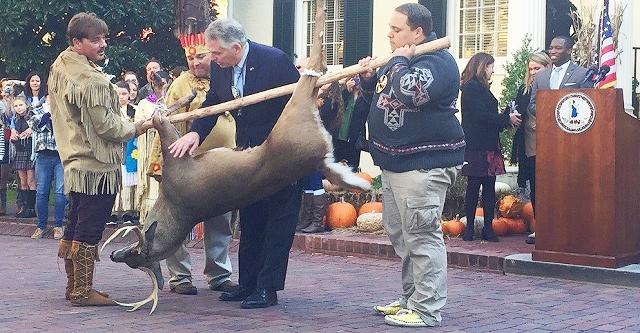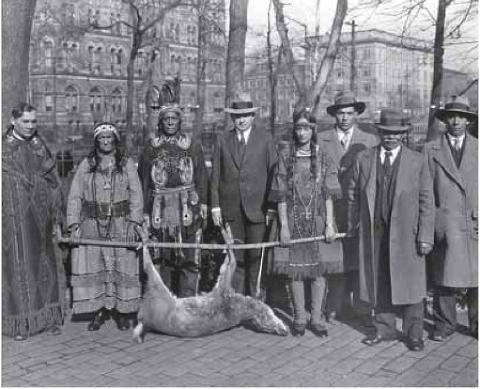 |
Canku Ota
|
 |
|
(Many Paths)
|
||
|
An Online Newsletter
Celebrating Native America
|
||
|
December 2015 - Volume
13 Number 12
|
||
|
|
||
|
A Thanksgiving Ritual:
Two Virginia Tribes Present Deer To Governor As Tribute |
||
|
by Joe Heim - Washington
Post
|
||
| RICHMOND, VA — Few traditions in America go back 338 years,
but on a crisp and glorious Wednesday morning here, Virginia Gov.
Terry McAuliffe and two Indian chiefs celebrated a cherished one.
It began with the chiefs chatting with the governor and his family over coffee and Danish pastry (and a few sips of beer) inside the governor's mansion, proceeded to speeches and tribal dancing by the Pamunkey and Mattaponi in front of the home and ended with governor milling with guests and patting a dead deer in his driveway on the head.
Just another morning in Richmond. The Treaty of Middle Plantation in 1677 was specific. The governor of the colony of Virginia, Herbert Jefferies, was to be paid each year in beaver skins. That demand is laid out in Article 16 of the peace and mutual protection accord between King Charles II of England and a number of Virginia's Indian tribes. "That every Indian King and Queen in the Moneth of March every year, with some of their Great Men, shall tender their Obedience to the Right Honourable His Majesties Governour at the place of his Residence, whereever it shall be, and then and there pay the accustomed Tribute of Twenty Beaver Skins to the Governour." Time passes. Things change. Virginia, as right honorable American history buffs know, is no longer a colony. Herbert Jefferies is no longer governor. Beaver pelts are just one more item on PETA's hit list. But 338 years later, tribute must still be paid. And so it was the day before Thanksgiving (in the Moneth of November) that Chief Mark Fallingstar Custalow of the Mattaponi and Chief Robert Gray of the Pamunkey and members of their tribes gathered on the driveway of the governor's mansion and presented its current resident and his wife with two trussed up deer, pottery, a bracelet and a bolo tie. Each tribe was responsible for one deer. The Pamunkey, who earlier this year became the first Virginia tribe to be granted federal recognition and are now fighting a challenge to that status, conducted their hunt Monday on their 1,200 acre reservation east of Richmond. It was cold and windy, but persistence paid off. Three deer were killed, including the 10-point buck they presented to McAuliffe. "We got a nice one for the governor," said Gray, whose tribe claims Pocohantas as an ancestor. "It was a good day." Gray and others in the tribe gutted the deer Monday night and prepared it for presentation. That included stuffing it with newspapers in plastic bags and sewing it back up so it wouldn't appear caved in. It's the kind of trick you learn when you present a deer year after year. Most years, including this one, the deer is donated to Hunters for the Hungry, a Virginia charity that has provided 23 million quarter-pound servings of venison to people in need since it began in 1991. (In 2010, then-Gov. Robert McDonnell (R) had the mansion's chef prepare the deer for dinner and reportedly enjoyed the meal.)
The annual event had become something of a scene in Richmond. It became such a big deal that a few years ago the tribes asked that the presentation be scaled back to a more manageable circus. On Wednesday, a crowd of 200 or so was on hand to witness the ceremony and take pictures with tribe members, many of whom wore ceremonial dress. What Virginia's Indians get in exchange, besides a photo op and coffee with the governor, is a bit unclear. The original treaty promised that the tribes would be allowed territory and hunting and fishing rights in exchange for their fealty to English rule. The Pamunkey and Mattaponi do have small reservations, but they are the only Virginia tribes that do. Indeed Virginia has not been especially kind to Indians. For decades in the 20th century the state's registrar, Walter Plecker, an unapologetic white supremacist and eugenicist, tried to eliminate the category of Indian from the state's records. It was an effort that critics labeled bureaucratic genocide and resulted in generations of Indians whose very identity was denied by the state. The effect of Plecker's racist practice has lingered long since his death in 1947. Identity issues plague Virginia's Indians and the dearth of records continues to be used against them. Though the Pamunkey took part in Wednesday's ceremony as a federally recognized tribe, their new status comes with an asterisk. After learning in July that they would become the first Virginia tribe to receive federal recognition, there was jubilation among the Pamunkey's 208 members. But that changed to weary resignation in October when the tribe was informed of a last-minute effort to derail their bid. Stand Up for California, a non-profit group that has sought to limit the federal recognition of tribes because it allows them to pursue gambling and casino interests, appealed the federal government's decision to award the Pamunkey recognition. It claimed that the tribe's members were not descendants of Indian ancestors. Last year, Stand Up teamed with casino giant MGM to officially oppose Pamunkey recognition. MGM is opening a $1.3 billion casino in Prince George's County next year and has made clear that it opposes any casino development in Virginia. If the Pamunkey are granted recognition, they would be able to pursue gambling interests, which they'd already begun discussing. On Wednesday, McAuliffe said he has written to the Bureau of Indian Affairs to request a prompt resolution of the challenge. "We have a long, continuous relationship here with the Native American community," said. "I support the federal recognition of these tribes. They've been here a very long time and they meet the criteria. We in Virginia have a harder burden because of Mr. Plecker, but we can get over that burden." Warren Taylor, a 22-year-old member of the Pamunkey, has made many trips to Richmond for this annual ceremony. As his tribe fights for recognition, he treasures the traditions like this one. "I hope it brings more attention to the tribe and puts Virginia Native American history at the forefront," he says. "I love the tribe. My culture gave me a future and so that's something I'm trying to repay." One day, he said, he hopes to be chief. |
||||
|
|
|
|
||
|
|
||
| Canku Ota is a free Newsletter celebrating Native America, its traditions and accomplishments . We do not provide subscriber or visitor names to anyone. Some articles presented in Canku Ota may contain copyright material. We have received appropriate permissions for republishing any articles. Material appearing here is distributed without profit or monetary gain to those who have expressed an interest. This is in accordance with Title 17 U.S.C. Section 107. | ||
|
Canku Ota is a copyright ©
2000 - 2015 of Vicki Williams Barry and Paul Barry.
|
||
 |
 |
|
|
The "Canku
Ota - A Newsletter Celebrating Native America" web site and
its design is the
|
||
|
Copyright ©
1999 - 2015 of Paul C. Barry.
|
||
|
All Rights Reserved.
|
||

